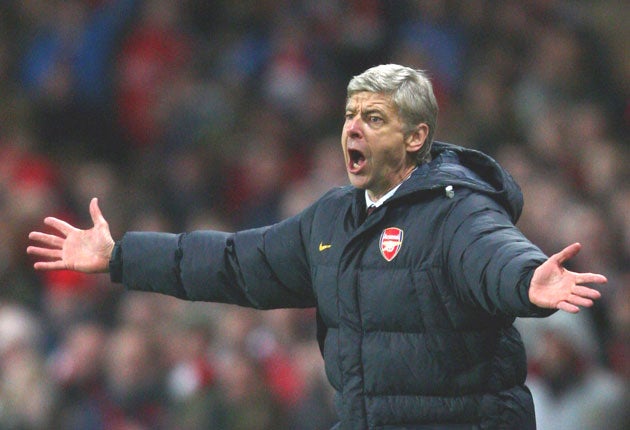It is an unfair and immoral bid, claims Wenger
Arsenal manager believes City are distorting transfer market to football's cost

Cheating? No. Unfair? Yes. Immoral? Probably. That was Arsène Wenger's verdict yesterday on Manchester City's extravagant pursuit of Kaka.
It was immoral because City were spending money they were not generating and, maybe, also because they were doing so when what he called the "real world" was in recession. As an economics graduate Wenger knows better than most the possible impact on the game of the credit crunch. His views were sobering. "At the moment England every day loses 3,000 jobs," he said. "You think that has no consequence on our game? It will have. So far the world has been hit by a financial crisis, not by an economic crisis. That will come in 2009.
"You can hide behind Man City buying Kaka for £100m. But that is an exception to what is happening in our world. We live in a football club which lives in the real world, we make money and spend our income." In that world Arsenal continue, said Wenger, to negotiate with Zenit St Petersburg for Andrei Arshavin. But it was clear he had no intention of meeting the £20m price mooted. "We spend the money we have and not the money we don't have. At the moment we are nowhere near signing him." Other players were also under consideration.
Should he find himself in competition with City for one of them he would pull out. "It is exactly what happened when [Roman] Ambramovich came in," said Wenger. "You go for a player, you see that Chelsea's on the case. You move somewhere else – that is it. City's money will be a disturbance in the market, an inflationary trend in a deflationary world.
"These are two clubs who have not the same rules as the other clubs. The question you can ask," he added, is whether every club should operate under the same financial controls.
Michel Platini, the president of Uefa, the European governing body, would like to bring in some restrictions, including the ending of the policy of billionaires "loaning", rather than giving, their money to clubs, as Abramovich has done with £700m in "soft loans" to Chelsea. Wenger has had his differences with his compatriot, but he said he approved of such a rule.
"I believe if a club produces £100m through the way it manages itself it's not immoral to spend it on a player," said Wenger. "This [Chelsea, Man City] is different because it's income from outside, from one specific person or a group of persons. The rules allow it so you cannot say it is cheating. It is unfair competition maybe, but it is not cheating. Money may not guarantee success but if you can get Kaka and Robinho you have more chances to win football games."
Was he envious? "No. I am more concerned with how can we win the next game, not how I would spend £100m. My purpose is to develop the team on a daily basis. It is a satisfaction for a club to live with its natural resources."
Wenger was also more interested in looking at how Arsenal can retain their support in what he described as "a worrying economic situation" than in Kaka's possible transfer. "That is living in the real world," he said, before breaking Emirates' visitors into four distinct groups. "Football has different types coming to the game. You have the client, who is the guy who pays one time to go to a big game and wants to be entertained. Then you have the spectator, who is the guy who comes to watch football. These two categories are aged between 40 and 60. Then you have the supporter of the club. He supports his club and goes to as many games as he can. Then you have the fan, a guy between 15 and 25 years old who gives all his money to his club. And you have to keep these categories faithful. Some of them have been hit harder by the crisis – or will be."
Arsenal are still selling out their 60,000-seat ground, and have 40,000 names on the season-ticket waiting list, all of whom paid £20 to go on it. But Wenger knows even Arsenal are not immune to the financial realities. He concluded: "It is true you keep fans loyal by buying big players, but you also keep your fans loyal if your club survives. What is important that, like in any business, you are in a healthy financial situation if you are faced with a crisis. It is the clubs that are in an unhealthy financial situation who then have to face reduced income who will be in trouble."
Join our commenting forum
Join thought-provoking conversations, follow other Independent readers and see their replies
Comments